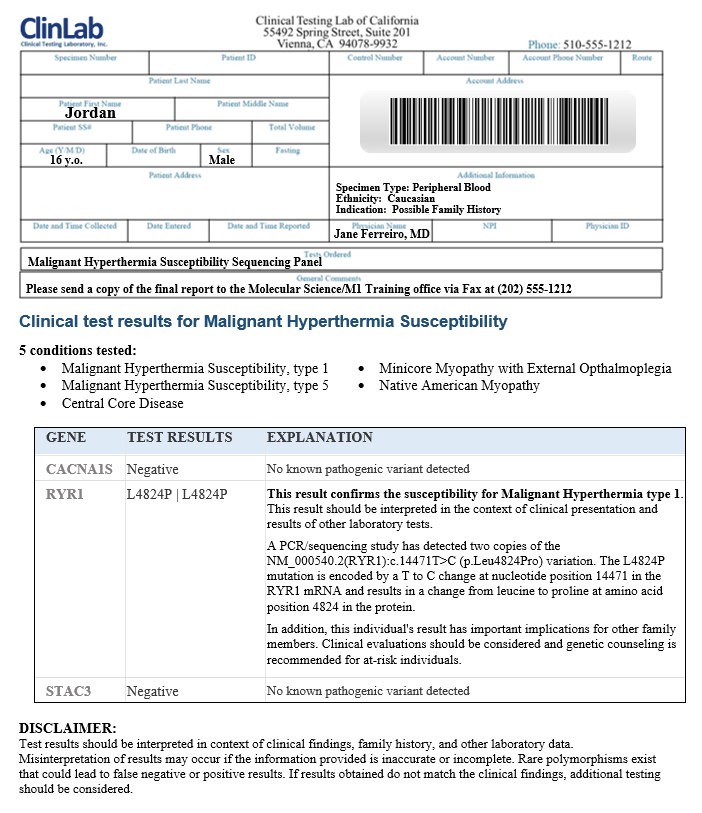Case 2: Genetic testing to support pharmacogenetic-based drug dosing
Approach/Workflow
Welcome to Your Patient!
 Charlotte, 52 year old female, was referred to you.... Charlotte, 52 year old female, was referred to you....Upcoming Procedure: Angioplasty for treat Acute Coronary Syndrome Charlotte was diagnosed with Acute Coronary Syndrome, scheduled for an angioplasty and informed that she would need to take clopidogrel (a.k.a. Plavix®) for at least 3-6 months. She mentioned that her father died of a stroke while taking the drug and was worried about her own situation. You should consider pharmacogenetic influences on clopidogrel response in this patient to see if a change in the prescription should be recommended. |
(P.S. She's doing great and has changed her approach to life with diet, exercise and a mental wellness plan!)
Learn more about Charlotte's potential clopidogrel issue
- To learn more about factors that may impact response to clopidogrel (Plavix®), search MedGen (https://www.ncbi.nlm.nih.gov/medgen/) with:
There are other great sources of information in the Additional descriptions section: a summary from the Medical Genetics Summaries.review article and from the MedlinePlusGenetics reference.
To learn more about factors impacting clopiogrel response, you can link to:
-
-
-
-
Medical Genetics Summaries to learn about patient response issues based on their CYP2C19 genotypes.
-
-
-
-
-
-
- In the Clinical resources section (on the right), clicking on PharmGKB will take you to a comprehensive reference source for pharmacology, clinical annotations, as well as prescribing and drug label information,
-
-
 What to take into consideration for ordering a Genetic Test.
What to take into consideration for ordering a Genetic Test.
-
-
-
- Pros
- Genetic tests are decreasing in cost & are not particularly invasive.
- A well-known genetic lesion can sometimes help in predicting drug response issues and may be annotated with guidance on adjusting dosage or switching to an alternative therapeutic.
- A finding may predict an issue before adverse event symptoms begin for proactive & preventative care.
- Cons
- We are early in our understanding of genes, gene variants and disease: Failure to detect a pathogenic variant does not rule out a potential problem.
- Prediction isn’t guaranteed as pathogenic variants sometimes do not cause the same issue in all patients (penetrance, severity, multi-genic & environmental influences).
- Lack of coverage by some insurance companies…
- Pros
-
-
Find a genetic test to order and examine the results
 If you need it, you can click here to get to a link for the Medgen record page.
If you need it, you can click here to get to a link for the Medgen record page.
Note: The information shown in the NIH Genetic Testing Registry (GTR) is submitted by the testing laboratory. If you have any questions, you should click the "Laboratory Contact" tab for ways to contact them directly.

There are two different nomenclatures used, what is it also called?
Validate the genetic test result assertion and find more information about a genetic variant
4, To validate what is asserted by this clinical testing laboratory, search NCBI’s ClinVar database (https://www.ncbi.nlm.nih.gov/clinvar/) with:
 If you need it, you can click here to get to a link for the ClinVar record page.
If you need it, you can click here to get to a link for the ClinVar record page.
Important! Assertions about the clinical significance or interpretation are provided to NCBI by submitters. All those who have provided information are listed in the Submitted interpretations and evidence section of the record, so that you can look at them all and learn more about what each submitter provided.![]() In addition to links in the Submitted interpretations and evidence table, the ClinVar record provides additional Citations for this variant - links to key PubMed records as well as other helpful resources.
In addition to links in the Submitted interpretations and evidence table, the ClinVar record provides additional Citations for this variant - links to key PubMed records as well as other helpful resources.
Find genotype-based actionable information
5. To find recommendations for a how Charlotte's genotype may require a shift in case management, go back to the MedGen page.
-
-
-
-
- a US Food and Drug Administration (FDA) statement
- a statement from the Clinical Pharmacogenetics Implementation Consortium (CPIC)
- a summary of recommendations from the Dutch Pharmacogenetics Working Group (DPWG) of the Royal Dutch Association for the Advancement of Pharmacy (KNMP)
-
-
-
-
-
-
- And a link to the Medical Genetics Summaries review article with all of the details.
-
-
 Now that you are a-ground....What to consider when discussing the results of a Genetic Test.
Now that you are a-ground....What to consider when discussing the results of a Genetic Test.
-
-
-
- Clinically, what do you do with this information?
- Hopefully, you already knew what to do with the information (potential impact of a genetic variant on the patient’s physiology and phenotype and how this relates to your choice of case management) – before the test was ordered.
- A patient may ask: “What is wrong with me and how can we fix or deal with it?" A great reason to consult with a Genetic Counselor!
- Outside of this planned clinical event: A patient may ask: “What do I (we) do now?”
- Implications for the patient - beyond this particular event: Consider having them discuss this with their primary care physician, dentist, and any other clinical professionals who may need to know for their care.
- Implications for the patient’s family members: Should they tell others?
- Clinically, what do you do with this information?
-
-
Find Patient Education materials to share with the patient and her family
- To assist you further in your communications with Charlotte and her family about this disorder, there are links to some helpful documents on the MedGen page.
-
-
- Professional literature such as the Medical Genetics Summaries review article or one of the Reviews in PubMed.
- For a more lay audience, you could find information in MedlinePlus (link) or MedlinePlus Genetics (link)
-
 Charlotte was aware of her father's adverse events with clopidogrel and was able to ask questions during her own care. The impact of a person's genetics on drug response is something many patients have not heard about. You discuss the results of the genetic test and let her know that you are recommending a change in prescription. You also provide patient education materials can be helpful for her to learn about the importance of this topic for her own health care. Charlotte was aware of her father's adverse events with clopidogrel and was able to ask questions during her own care. The impact of a person's genetics on drug response is something many patients have not heard about. You discuss the results of the genetic test and let her know that you are recommending a change in prescription. You also provide patient education materials can be helpful for her to learn about the importance of this topic for her own health care.In addition to her own situation, Charlotte is concerned about the implications of this clopidogrel response issue for other members of her family. She would like to know if this might impact the efficacy and safety for other medications they may be prescribed. |
Case Recap
This case study demonstrated how genetic testing can be helpful to identify those with potential problems in drug response which could ultimately cause severe adverse events in people like Charlotte (an her father).- Case management for the disorder
- Charlotte's drug metabolism may be compromized.
- Based on her genotype, Charlotte (and likely her father) are classified as Poor Metabolisers with regard to clopidogrel.
- Clopidogrel is a pro-drug and needs to be activated for full potency to prevent overclotting by inhibiting it's target - the P2RY12 receptor which plays a central role in platelet activation and recruitment of other platelets for clotting.
- If clopidogrel is not activated, as in the case of poor metabolizers, the P2RY12 receptor continues to promote platelet aggregation and blood clot formation which can lead to heart attacks, strokes, and thromboses in individuals with a history of these conditions.
- Therefore, clopidogrel should be avoided and instead an alternative drug which is not activated by CYP2C19 should be prescribed, such as prasugrel or ticagrelor.
- Charlotte's drug metabolism may be compromized.
- As Charlotte already noted, certain medications may pose a much greater risk to her and members of her family who have inherited the same genetic variant.
- Therefore, they may want to inform other healthcare practicioners who may prescribe drugs impacted by CYP2C19 variants (PharmGKB & CPIC Guidelines)
Take-away Message!
This case study was an example of how pharmacogenetic testing might be able to provide critical information to optimioze case management plan for a particular patient based on their genetics. It also showed that understanding a patient's particular risk may have wide implications for both themselves and their families and could help to inform health and medical care long-term.
Last Reviewed: April 18, 2023

